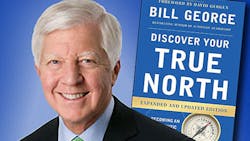Michael Baker, a West Point graduate, joined Medtronic in 1989 and soon established himself as a rising star at the medical products manufacturer. But when he had trouble with an assignment in 1997, he was moved to a new job. Upset with the change, he left the company.
Two years later, he became chief executive of ArthroCare Corp., an orthopedic devices company, and led it to nine years of rapid growth. But in 2008, the company's auditors found discrepancies in its revenue and earnings. A federal investigation ensued and Baker was convicted of fraud and lying under oath in a $750 million securities fraud scheme. In August 2014, he was sentenced to 20 years in prison and, with his CFO, ordered to pay $22 million in restitution.
"Baker's case still gnaws at me," Bill George writes in the newly revised edition of his leadership bestseller, Discover Your True North (John Wiley & Sons, 2015). He surmises that Baker got "too caught up in his success" and that led him to rationalize the accounting misdeeds.
Was Baker simply a crook? George, former CEO of Medtronic and a professor at Harvard Business School, doesn't think so. "Knowing Baker as I did, I can't see him simply as greedy or evil, but rather a leader who lost his way."
In life, much like on a hike in the woods, we need a compass that keeps us on the right path. George refers to this as "True North," the values and principles we believe in and that guide our leadership. It's not uncommon for leaders to get pulled off track, says George, particularly in an era where there is so much pressure from Wall Street to play the "short-term earnings game." Leaders can go off course because of the pressures they face, George told IndustryWeek, or the "seductions of money, fame and power."
George is a strong proponent of authenticity in leadership, or being true to yourself.
"There is nothing worse than seeing people try to emulate somebody else or faking being what they think is a leader when they really are not," he says. He recalls an interview for the book with Kevin Sharer, the former CEO of Amgen, who had worked as an assistant to Jack Welch at GE. Sharer told George "we had 1,000 people running around GE who were trying to be little Jacks."
How do leaders stay on track? George says the "difference between those who succeed and those who fail is emotional intelligence and self-awareness." To develop that emotional intelligence, he advocates two practices.
- Have an introspective period of at least 20 minutes a day. George says we are bombarded by emails, social media and meetings. "We have to pull back from that, whether we meditate, pray, journal, take a jog," he says, and use that time to take stock of the day and determine if we are "emphasizing what is important in our lives."
- Get honest feedback from people you trust and will listen to. While people you work with can help make up that support team, George says it is particularly valuable to have a group outside the workplace that you can consult with. He has been part of a men's group for 40 years that meets on Wednesday mornings. "They can give you honest, sincere advice because they know you at a deeper level," he said.
Following these practices, says George, can move leaders away from "external gratifiers like money and power" and toward leadership that is more about "making a difference and empowering other people."
About the Author
Steve Minter
Steve Minter, Executive Editor
Focus: Leadership, Global Economy, Energy
Call: 216-931-9281
Follow on Twitter: @SgMinterIW
An award-winning editor, Executive Editor Steve Minter covers leadership, global economic and trade issues and energy, tackling subject matter ranging from CEO profiles and leadership theories to economic trends and energy policy. As well, he supervises content development for editorial products including the magazine, IndustryWeek.com, research and information products, and conferences.
Before joining the IW staff, Steve was publisher and editorial director of Penton Media’s EHS Today, where he was instrumental in the development of the Champions of Safety and America’s Safest Companies recognition programs.
Steve received his B.A. in English from Oberlin College. He is married and has two adult children.
